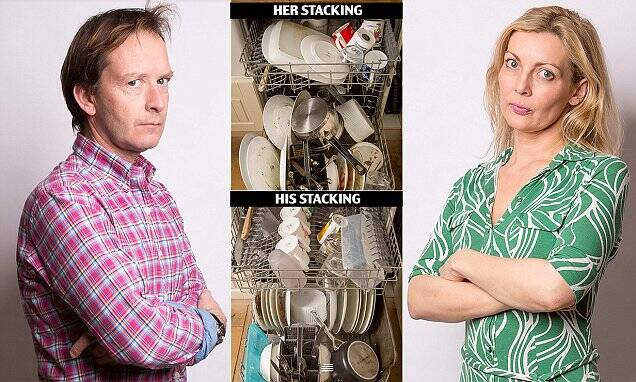The Great Dishwasher Debate
Right, let's address the elephant in the kitchen: the dishwasher.
Specifically, the apparent impossibility of stacking it correctly.
Now, I'm going to be honest here. There's a correct way to stack a dishwasher.
This isn't subjective. It's not a matter of opinion.
Plates go in the bottom rack, facing inward.
Cups on the top.
Cutlery in the basket, sharp end down.
Big items at the back, small items at the front.
Nothing blocking the spray arms.
This is not complicated.
Millions of people manage this daily without incident.
Now according to some of my customer's partners, they are not one of those people.
Not anymore.
The Chaos Theory of Dishwasher Loading
Pre-menopause: dishwasher stacked efficiently.
Everything in its place. Logical. Organised.
Post-menopause: absolute carnage.
Cups on the bottom rack (they'll fill with water).
Plates leaning at impossible angles (they won't get clean).
Big serving dish blocking everything (nothing behind it will get washed).
Cutlery all facing different directions (handle up, handle down, horizontal across the top—why?).
The tupperware placed perfectly to flip upside down and fill with dirty water.
"Did you load the dishwasher?"
"Yes."
"Can I just... rearrange a few things?"
"Why? What's wrong with it?"
Where do I start?
The Defensive Position
She knows it's wrong. She KNOWS. But acknowledging it feels like admitting defeat.
"The cups need to go on the top."
"They fit on the bottom."
"They fit, but they'll fill with water."
"Then put them on the top if you're so bothered."
"I'm just trying to help."
"You're criticizing."
I'm not criticizing. I'm attempting to prevent us from owning a collection of cups full of stagnant dishwasher water. There's a difference.
But she's already upset. The dishwasher has become another battlefield.
The Cognitive Load Theory
Here's the thing: she's not being deliberately difficult.
Her brain's operating on limited resources (remember Chapter 8—the Poundland battery?).
Loading a dishwasher correctly requires:
- Spatial reasoning
- Memory (where things go)
- Executive function (organizing efficiently)
- Attention to detail
All of these are affected by menopause.
So what used to be automatic—stack the dishwasher correctly without thinking—now requires mental effort she doesn't have.
The result?
Chaos.
Well-meaning chaos, but chaos nonetheless.
The Bigger Picture
The dishwasher thing isn't really about the dishwasher. It's about:
- Cognitive decline (temporary but real)
- Loss of competence in simple tasks
- Feeling like she's failing at basic things
- Your frustration at household inefficiency
It's symbolic of the bigger challenges.
And it's bloody annoying.
Let's be honest.
But in the grand scheme of menopause symptoms, incorrectly stacked dishwasher ranks fairly low on the "terrible things to deal with" scale.
Words of Wisdom (From the Dishwasher Police)
Dishwasher incompetence is frustrating but minor. What you can do:
-
Just do it yourself. Seriously. It takes five minutes.
-
Don't make it a big deal. It's plates. Not international diplomacy.
-
Laugh about it. If you can't laugh, you'll cry.
-
Remember it's temporary. Her spatial reasoning will return.
-
Be grateful. At least she's trying to help.
And hey, in a few years, you'll miss the dishwasher debates.
Okay, you probably won't.
But pretend you might.

Add comment
Comments